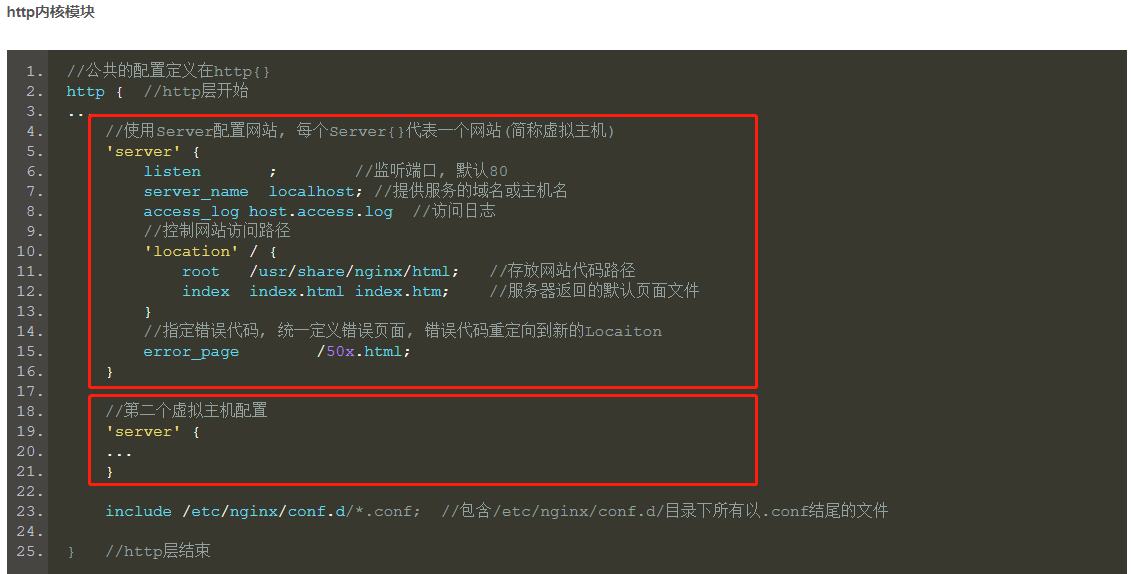centos安装nginx并配置访问
安装nginx
yum install -y nginx
安装完直接启动
# 启动nginx
systemctl start nginx
# 查看nginx服务状态
systemctl status nginx
编辑配置文件
编辑nginx配置文件:
vim /etc/nginx/nginx.conf
配置文件里html里面的就行
一个server{}代表一个网站/虚拟主机配置
这是原来默认的
##以下是原来默认的
server {
listen 80;
listen [::]:80;
server_name _;
root /usr/share/nginx/html;
# Load configuration files for the default server block.
include /etc/nginx/default.d/*.conf;
error_page 404 /404.html;
location = /404.html {
}
error_page 500 502 503 504 /50x.html;
location = /50x.html {
}
}
把上面原来的加#注释掉,复制下来修改
##以下service是自己修改加的
server
{
listen 80;
server_name localhost;
location / {
root /myproject/xxxxx;
index index.html index.htm;
}
error_page 404 /404.html;
location = /404.html {
}
error_page 500 502 503 504 /50x.html;
location = /50x.html {
#root /www/wwwroot/default; 这个是apache才有的 可以删除
}
}
就可以啦。然后重启nginx。具体命令看文章下方。
文件配置简要说明:

参考链接:
https://www.cnblogs.com/mstmdev/p/16069790.html
https://www.bbsmax.com/A/QW5YjYDqdm/
https://www.cnblogs.com/tckey/p/12976902.html
https://www.jb51.cc/nginx/1020799.html
常见nginx命令
1.查看nginx版本
[root@localhost ~]# nginx -V
2.查看nginx状态
[root@localhost ~]# ps -ef | grep nginx
5.停止nginx(一般使用这个就行)
(stop表示立即停止nginx,不保存相关信息)
[root@localhost ~]# nginx -s stop
6.停止nginx-quit
(quit表示立即停止nginx,并保存相关信息)
[root@localhost ~]# nginx -s quit
7.重载/重启nginx
[root@localhost ~]# nginx -s reload
8.重新打开日志文件
[root@localhost ~]# nginx -s reopen
2.启动nginx
[root@localhost ~]# systemctl start nginx.service
问题
如果nginx配置好了默认访问路径,端口也放开了,其他都弄好了,但访问还是出现403的时候,可能是以下问题。
1.开启了SeLinux,安全增强型Linux
默认SELinux设置为了开启状态(enabled)。
查看当前selinux的状态。
/usr/sbin/sestatus
解决办法:
找到/etc/selinux/config 文件
将文件内修改为:
#SELINUX=enforcing
SELINUX=disabled #注释之前,替换为这个
注释掉第一行的#SELINUX=enforcing
添加第二行的SELINUX=disabled
保存文件。服务器重启。
reboot
重启后记得启动nginx服务,再访问。
成功。
参考链接:
https://blog.csdn.net/weixin_44138647/article/details/103589130



【推荐】国内首个AI IDE,深度理解中文开发场景,立即下载体验Trae
【推荐】编程新体验,更懂你的AI,立即体验豆包MarsCode编程助手
【推荐】抖音旗下AI助手豆包,你的智能百科全书,全免费不限次数
【推荐】轻量又高性能的 SSH 工具 IShell:AI 加持,快人一步
· winform 绘制太阳,地球,月球 运作规律
· AI与.NET技术实操系列(五):向量存储与相似性搜索在 .NET 中的实现
· 超详细:普通电脑也行Windows部署deepseek R1训练数据并当服务器共享给他人
· 【硬核科普】Trae如何「偷看」你的代码?零基础破解AI编程运行原理
· 上周热点回顾(3.3-3.9)